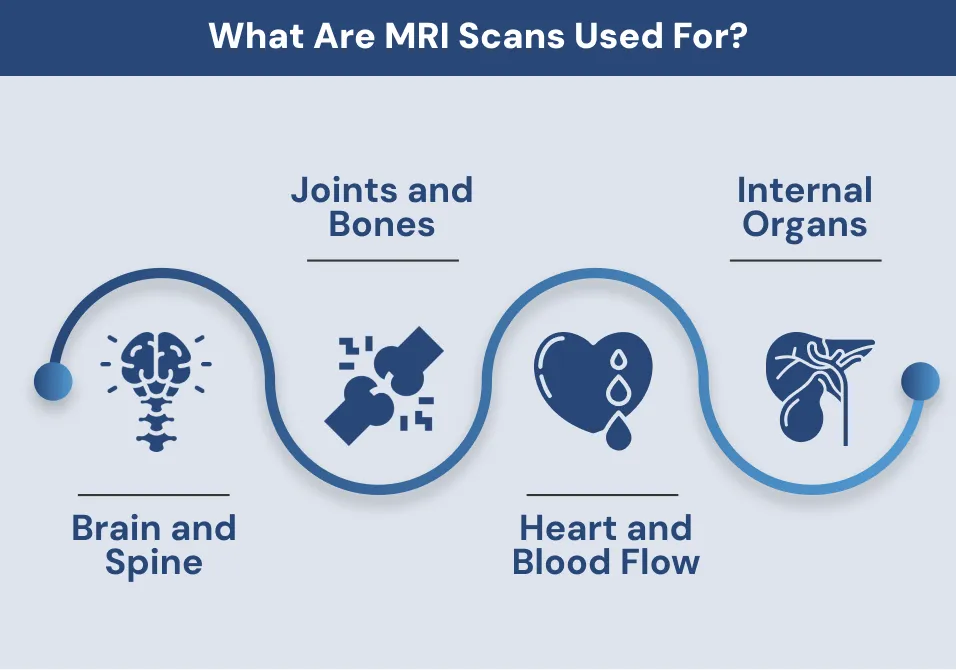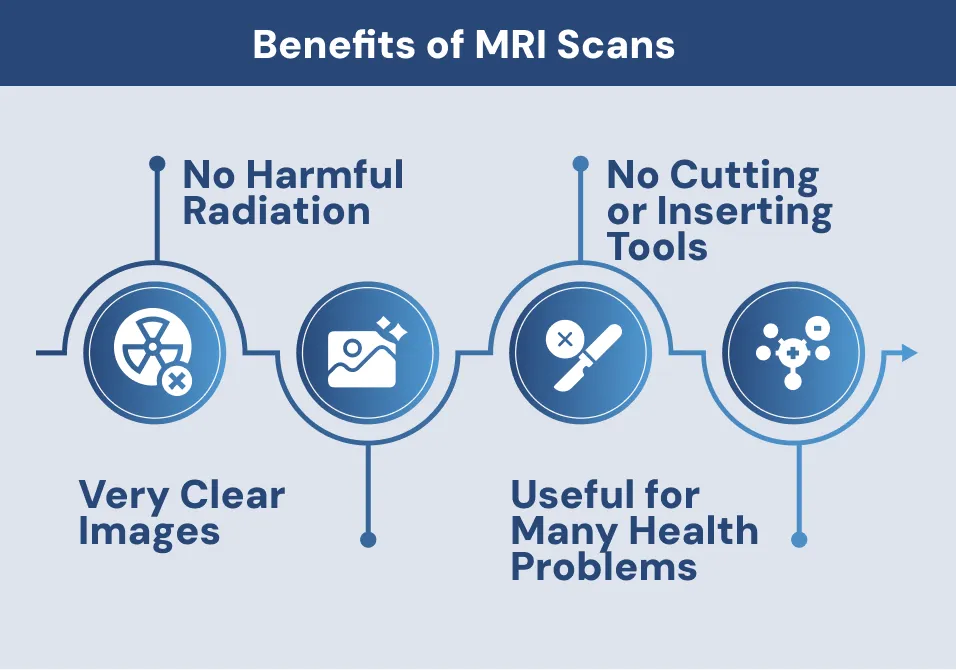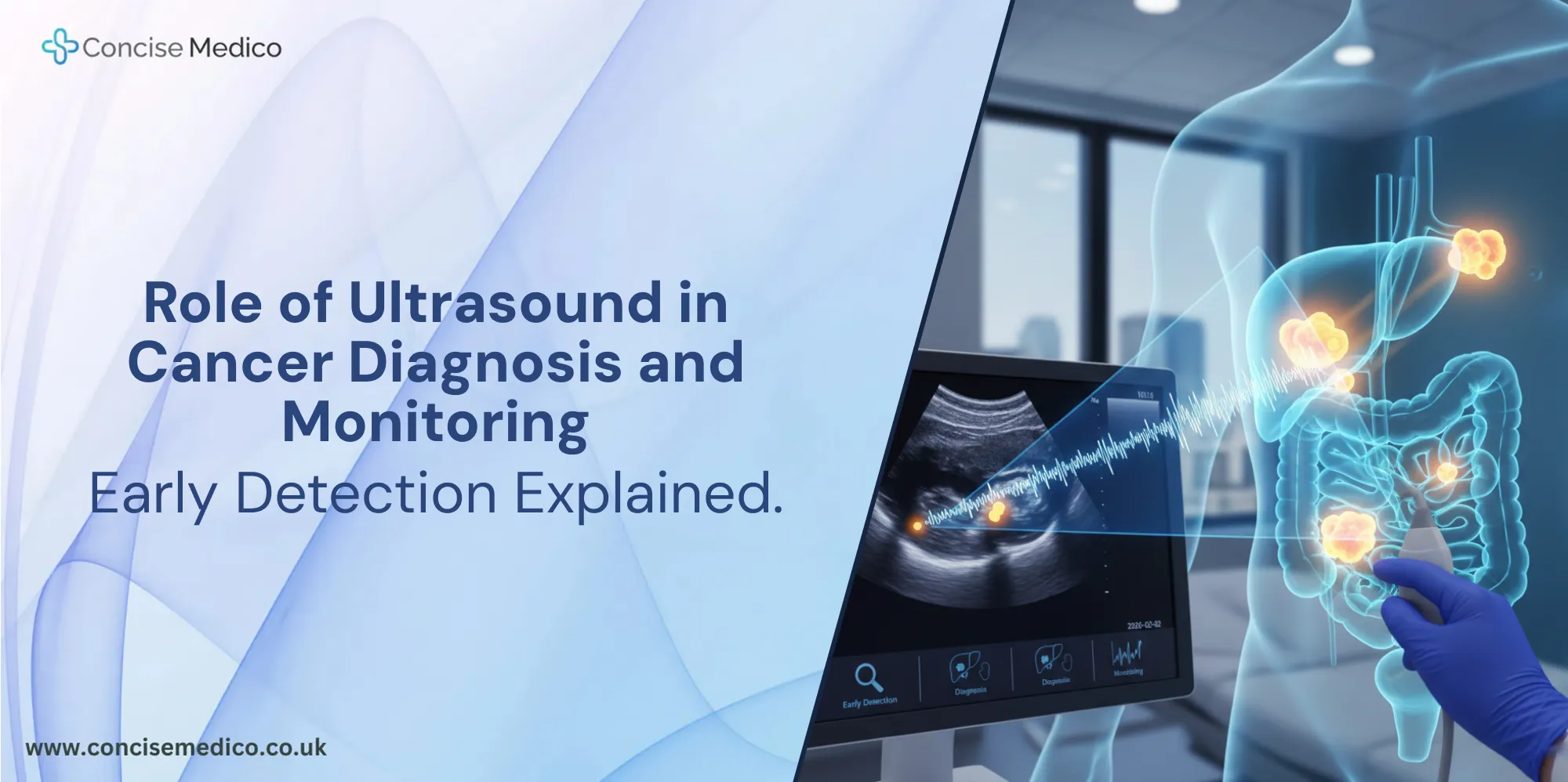A lot of people get an MRI when they are not sure what is causing pain or discomfort inside the body. It gives doctors a clear look without needing to do any kind of surgery. You can have it done through the NHS or arrange it at a private clinic if you prefer.This guide explains what the MRI Scans do, their costs and benefits and what may change in the future.
What is an MRI?
It is a short form of Magnetic Resonance Imaging. It is used to take clear pictures inside your body suing strong magnets and sound waves. This scan is used to check soft areas like the brain muscles and other organs.
How MRI Works
MRI scans do not use radiation as those used in X-rays or CT scans. It works in the following ways:
- It uses a large magnet and radio waves
- The machine detects signals from water in your body
- A computer turns these signals into detailed images
What Are MRI Scans Used For?
MRI scans help doctors diagnose and monitor many health conditions. They are used across different parts of the body.
Where MRI Is Often Used
Brain and Spine
Doctors rely on it to spot things like strokes, tumors and nerve problems. It is also helpful when someone has ongoing headaches seizures or memory issues.
Joints and Bones
It gives a clear view of muscles, joints and bones. This helps show damage from injuries swelling in the joints or signs of infection that may not show up in regular scans.
Heart and Blood Flow
The scan shows how well the heart is working and whether blood is moving as it should. It is often used when checking for heart failure, weak valves or blocked vessels.
Internal Organs
MRI helps study organs like the liver, kidneys and uterus. It can find signs of disease swelling or anything that looks out of place.

Other Helpful Uses
Finding Cancer
Doctors use the scan to see where a tumour is and if it has spread to other parts of the body. It gives a clear picture without needing surgery.
Planning for Surgery
Surgeons often study the images to prepare before an operation. It helps them work with better accuracy and avoid healthy areas.
Checking Progress
Scans are used again during treatment to see how the body is responding. This helps guide the next steps and shows if changes are helping.
What Is the Procedure for MRI Scans?
It is usually a simple and safe process. Here is what to expect:
Step-by-Step Procedure
-
Before the Scan:
- You may need to change your dress into a gown.
- Remove all metal items (jewellery, watches, etc.).
- Tell the radiographer if you have implants or metal in your body.
-
During the Scan:
- You will lie on a bed that slides into the MRI scanner.
- The machine may be open-ended or tube-shaped.
- You must stay still to get clear images.
- The scan can continue for 15 and 90 minutes.
- You will hear loud noises; earplugs or headphones are usually provided.
-
After the Scan:
- You can go home immediately.
- There is no recovery time needed unless you were given a sedative or contrast dye.
Benefits of MRI Scans
Doctors use MRI more and more these days because it gives a clear picture of what is going on inside the body. It is often chosen instead of other scans because of how safe and detailed it is. Here are some reasons why many people go for it:
No Harmful Radiation
Unlike other scans like X-rays or CT scans this one does not use radiation. It works with magnets and sound waves to take clear images. It feels safe for people who need scans often. It is also suitable for those who are more at risk like children or pregnant women. Since there is no radiation it lowers the chance of long-term side effects which makes it a better choice for repeat testing.
Very Clear Images
The pictures from an MRI show a lot of detail especially in soft parts of the body. It is great for looking at the brain spine muscles and organs. Doctors can spot problems like tumours, torn tissues or nerve issues more easily. Because it shows even small changes it helps with early diagnosis and better planning for treatment.
No Cutting or Inserting Tools
There is no surgery involved. You just lie down on a table which slowly moves into the scanner. There is no pain during the scan and no recovery time after. That makes it easier and less stressful for most people compared to tests that need tools or cuts.

Useful for Many Health Problems
This scan helps in different areas of medicine. It is often used in brain spine and joint problems and also to check the heart or find cancer. Whether it is a sports injury or a long-term illness the scan can be adjusted to suit different needs. That is why so many doctors trust it and use it regularly.
“MRI provides better soft tissue contrast than CT and can differentiate better between fat, water, muscle, and other soft tissue.”
Read more about the usage of MRI Expert Witness in Personal Injury Cases.
Risks Associated with MRI Scans
The benefits of MRI scans make them a better and safer option for most people, but there are some risks:
Who Should Avoid MRI
Some people may need to avoid an MRI. This includes anyone who has a pacemaker or metal implant that is not marked as safe for MRI. It also includes those who have metal fragments in their body from an old injury or accident.
Possible Risks
For most people an MRI scan goes smoothly but there are a few things that can cause a bit of trouble. These are not very common but still good to know before your appointment.
Dye Used in Some Scans
For certain scans a dye is given to make the images clearer. Most people do not feel anything strange after it. A few might feel a little itchy or just not quite right for a short time. Serious problems are very rare and the team will be there to look after you if anything feels off.
Being Inside the Machine
Lying still inside the scanner can feel a bit much for some people especially if you are not comfortable in small spaces. The machine is tight and the process can take a little while. If you feel nervous or uneasy just let the staff know. They can guide you through it help you stay calm or use a scanner that feels more open.
The Loud Noises
The machine makes banging and tapping sounds while it takes the images. It can be pretty loud especially if you are not ready for it. Most places give you headphones or earplugs so it is not too overwhelming. Just try to stay relaxed until it is over.
Always talk to your doctor if you have any concerns before the scan.
MRI Side Effects
Most people have no side effects after an MRI scan. However, a few may experience:
Common Side Effects
- Mild Headache after the scan
- Dizziness or light-headed feeling
- Fatigue
If Contrast Dye is Used
- You might feel cold when the dye is injected
- Rare cases of nausea or allergic reaction
- People with kidney problems should discuss risks with a doctor first
Costs of MRI Scans
MRI scans in the UK can be done through the NHS or private providers.
NHS MRI Scans
- Free of charge
- Often requires a GP referral
- May involve long waiting times depending on location
Private MRI Scans
- Faster access and more flexibility
- Prices vary by clinic and body part
Sample Costs:
- Standard MRI (one area): From £269
- Open MRI: From £525
- Full Body MRI: Around £995
Check Affordable MRI Scan Services by Concise Medico in the UK.
The Future of MRI and Advances in It
Things are changing fast in the world of MRI. New machines and smart tools are making the process better for both doctors and patients. The goal is to make scans quicker, more comfortable and easier to access.
Smart Systems Helping Doctors
Some hospitals are now using computer programs that learn from past scans. These tools help doctors find small signs of illness like tumours or damaged tissue. They work by spotting patterns that may be hard to notice with the human eye. In the UK around 100 scanners are being upgraded with this new software. This will help doctors do more scans each day and cut down waiting times for patients.
Less Time in the Machine
New designs are making the scan much faster. People no longer have to lie still for long which makes things easier for children, older adults or anyone who feels uneasy during medical tests. A shorter scan means less stress and more comfort.
Machines That Can Be Taken Anywhere
Some of the newer MRI machines are small and light enough to be moved around. These are now being used in places where big machines do not fit like small clinics or emergency rooms. They help doctors check patients quickly and start treatment without delay. This makes a big difference in situations where time and space are limited.
Future Possibilities
- Better use of 3D imaging
- Higher resolution scans
- More affordable and accessible machines
These changes will help more people benefit from MRI scans in the future.
Get detailed insight into Advances in MRI Technology- Future Trends.
Case Study: Nancy – 14‑Month‑Old Brain Tumour Patient at Nottingham QMC
Nancy, a 14-month-old toddler, showed some neurological symptoms. An ependymoma (brain tumour) was detected via initial screening. After six days she underwent intraoperative MRI (iMRI). This is one of the first services in the UK capable of scanning both adults and children during an operation.
The scan allowed surgeons to immediately check for any residual tumour tissue. Instead of stopping at ~50% removal, they were able to completely excise the tumour—100% removal confirmed during the same surgery. Four days post-surgery, she was home and “back to terrorising her brother”– a remarkably swift recovery
Get Your MRI Scan
MRI is one of the best ways for doctors to see what is going on inside the body without doing anything painful. In the UK you can get a scan through the NHS or by booking a private MRI scan. The good thing is that as technology keeps moving forward MRI scans are getting easier to use and more available for everyone who needs them.
If you ever need one for a diagnosis or for expert testimony, Concise Medico is your go-to place. Schedule a detailed MRI Scan for injury diagnostics.
FAQs
A lot of people get an MRI when they are not sure what is causing pain or discomfort inside the body. It gives doctors a clear look without needing to do any kind of surgery. You can have it done through the NHS or arrange it at a private clinic if you prefer.This guide explains what the MRI Scans do, their costs and benefits and what may change in the future.
What is an MRI?
It is a short form of Magnetic Resonance Imaging. It is used to take clear pictures inside your body suing strong magnets and sound waves. This scan is used to check soft areas like the brain muscles and other organs.
How MRI Works
MRI scans do not use radiation as those used in X-rays or CT scans. It works in the following ways:
- It uses a large magnet and radio waves
- The machine detects signals from water in your body
- A computer turns these signals into detailed images
What Are MRI Scans Used For?
MRI scans help doctors diagnose and monitor many health conditions. They are used across different parts of the body.
Where MRI Is Often Used
Brain and Spine
Doctors rely on it to spot things like strokes, tumors and nerve problems. It is also helpful when someone has ongoing headaches seizures or memory issues.
Joints and Bones
It gives a clear view of muscles, joints and bones. This helps show damage from injuries swelling in the joints or signs of infection that may not show up in regular scans.
Heart and Blood Flow
The scan shows how well the heart is working and whether blood is moving as it should. It is often used when checking for heart failure, weak valves or blocked vessels.
Internal Organs
MRI helps study organs like the liver, kidneys and uterus. It can find signs of disease swelling or anything that looks out of place.

Other Helpful Uses
Finding Cancer
Doctors use the scan to see where a tumour is and if it has spread to other parts of the body. It gives a clear picture without needing surgery.
Planning for Surgery
Surgeons often study the images to prepare before an operation. It helps them work with better accuracy and avoid healthy areas.
Checking Progress
Scans are used again during treatment to see how the body is responding. This helps guide the next steps and shows if changes are helping.
What Is the Procedure for MRI Scans?
It is usually a simple and safe process. Here is what to expect:
Step-by-Step Procedure
-
Before the Scan:
- You may need to change your dress into a gown.
- Remove all metal items (jewellery, watches, etc.).
- Tell the radiographer if you have implants or metal in your body.
-
During the Scan:
- You will lie on a bed that slides into the MRI scanner.
- The machine may be open-ended or tube-shaped.
- You must stay still to get clear images.
- The scan can continue for 15 and 90 minutes.
- You will hear loud noises; earplugs or headphones are usually provided.
-
After the Scan:
- You can go home immediately.
- There is no recovery time needed unless you were given a sedative or contrast dye.
Benefits of MRI Scans
Doctors use MRI more and more these days because it gives a clear picture of what is going on inside the body. It is often chosen instead of other scans because of how safe and detailed it is. Here are some reasons why many people go for it:
No Harmful Radiation
Unlike other scans like X-rays or CT scans this one does not use radiation. It works with magnets and sound waves to take clear images. It feels safe for people who need scans often. It is also suitable for those who are more at risk like children or pregnant women. Since there is no radiation it lowers the chance of long-term side effects which makes it a better choice for repeat testing.
Very Clear Images
The pictures from an MRI show a lot of detail especially in soft parts of the body. It is great for looking at the brain spine muscles and organs. Doctors can spot problems like tumours, torn tissues or nerve issues more easily. Because it shows even small changes it helps with early diagnosis and better planning for treatment.
No Cutting or Inserting Tools
There is no surgery involved. You just lie down on a table which slowly moves into the scanner. There is no pain during the scan and no recovery time after. That makes it easier and less stressful for most people compared to tests that need tools or cuts.

Useful for Many Health Problems
This scan helps in different areas of medicine. It is often used in brain spine and joint problems and also to check the heart or find cancer. Whether it is a sports injury or a long-term illness the scan can be adjusted to suit different needs. That is why so many doctors trust it and use it regularly.
“MRI provides better soft tissue contrast than CT and can differentiate better between fat, water, muscle, and other soft tissue.”
Read more about the usage of MRI Expert Witness in Personal Injury Cases.
Risks Associated with MRI Scans
The benefits of MRI scans make them a better and safer option for most people, but there are some risks:
Who Should Avoid MRI
Some people may need to avoid an MRI. This includes anyone who has a pacemaker or metal implant that is not marked as safe for MRI. It also includes those who have metal fragments in their body from an old injury or accident.
Possible Risks
For most people an MRI scan goes smoothly but there are a few things that can cause a bit of trouble. These are not very common but still good to know before your appointment.
Dye Used in Some Scans
For certain scans a dye is given to make the images clearer. Most people do not feel anything strange after it. A few might feel a little itchy or just not quite right for a short time. Serious problems are very rare and the team will be there to look after you if anything feels off.
Being Inside the Machine
Lying still inside the scanner can feel a bit much for some people especially if you are not comfortable in small spaces. The machine is tight and the process can take a little while. If you feel nervous or uneasy just let the staff know. They can guide you through it help you stay calm or use a scanner that feels more open.
The Loud Noises
The machine makes banging and tapping sounds while it takes the images. It can be pretty loud especially if you are not ready for it. Most places give you headphones or earplugs so it is not too overwhelming. Just try to stay relaxed until it is over.
Always talk to your doctor if you have any concerns before the scan.
MRI Side Effects
Most people have no side effects after an MRI scan. However, a few may experience:
Common Side Effects
- Mild Headache after the scan
- Dizziness or light-headed feeling
- Fatigue
If Contrast Dye is Used
- You might feel cold when the dye is injected
- Rare cases of nausea or allergic reaction
- People with kidney problems should discuss risks with a doctor first
Costs of MRI Scans
MRI scans in the UK can be done through the NHS or private providers.
NHS MRI Scans
- Free of charge
- Often requires a GP referral
- May involve long waiting times depending on location
Private MRI Scans
- Faster access and more flexibility
- Prices vary by clinic and body part
Sample Costs:
- Standard MRI (one area): From £269
- Open MRI: From £525
- Full Body MRI: Around £995
Check Affordable MRI Scan Services by Concise Medico in the UK.
The Future of MRI and Advances in It
Things are changing fast in the world of MRI. New machines and smart tools are making the process better for both doctors and patients. The goal is to make scans quicker, more comfortable and easier to access.
Smart Systems Helping Doctors
Some hospitals are now using computer programs that learn from past scans. These tools help doctors find small signs of illness like tumours or damaged tissue. They work by spotting patterns that may be hard to notice with the human eye. In the UK around 100 scanners are being upgraded with this new software. This will help doctors do more scans each day and cut down waiting times for patients.
Less Time in the Machine
New designs are making the scan much faster. People no longer have to lie still for long which makes things easier for children, older adults or anyone who feels uneasy during medical tests. A shorter scan means less stress and more comfort.
Machines That Can Be Taken Anywhere
Some of the newer MRI machines are small and light enough to be moved around. These are now being used in places where big machines do not fit like small clinics or emergency rooms. They help doctors check patients quickly and start treatment without delay. This makes a big difference in situations where time and space are limited.
Future Possibilities
- Better use of 3D imaging
- Higher resolution scans
- More affordable and accessible machines
These changes will help more people benefit from MRI scans in the future.
Get detailed insight into Advances in MRI Technology- Future Trends.
Case Study: Nancy – 14‑Month‑Old Brain Tumour Patient at Nottingham QMC
Nancy, a 14-month-old toddler, showed some neurological symptoms. An ependymoma (brain tumour) was detected via initial screening. After six days she underwent intraoperative MRI (iMRI). This is one of the first services in the UK capable of scanning both adults and children during an operation.
The scan allowed surgeons to immediately check for any residual tumour tissue. Instead of stopping at ~50% removal, they were able to completely excise the tumour—100% removal confirmed during the same surgery. Four days post-surgery, she was home and “back to terrorising her brother”– a remarkably swift recovery
Get Your MRI Scan
MRI is one of the best ways for doctors to see what is going on inside the body without doing anything painful. In the UK you can get a scan through the NHS or by booking a private MRI scan. The good thing is that as technology keeps moving forward MRI scans are getting easier to use and more available for everyone who needs them.
If you ever need one for a diagnosis or for expert testimony, Concise Medico is your go-to place. Schedule a detailed MRI Scan for injury diagnostics.




